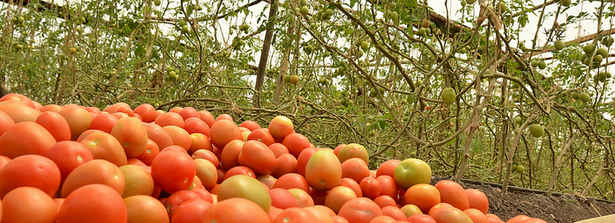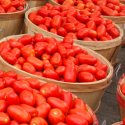Expert discussion about Fruits & Vegetables and Food & Nutrition Security

The preliminary results of the report “How does the Fruit and Vegetable Sector contribute to Food and Nutrition Security?” by LEI-Wageningen UR (LEI-WUR) were discussed during a meeting in early March 2015, facilitated by the Food & Business Knowledge Platform and hosted by ‘TopSector’ Horticulture and Starting Materials. The participants were 15 experts from knowledge institutes, the private sector, civil society, network organisations, and the Ministries of Foreign and Economic Affairs.
LEI-WUR presented the questions that the explorative study focuses on, as well as the definitions and approach used during the research and the preliminary findings. The study is expected to explore whether – and to what extent – investments and interventions in the development of the Fruits and Vegetables sector contribute to enhanced food and nutrition security – with special attention on women and youth. Moreover, it aims to find out which investments and interventions have the greatest impact. It is also analyses whether the ‘development return’ on investments is higher in the Fruits and Vegetables sector than in other agricultural sectors. The publication of the full study report is expected by May 1st and conclusions will be presented in the next newsletter.
This article presents some of the highlights of the animated discussion among the experts on the approach of the study and the preliminary findings. They made interesting and useful comments on current programmes:
- Dutch public and private actors have been involved in various (often official development assistance funded) initiatives in the Fruits and Vegetables sector aimed at increasing production. Many of these programmes do not have data available or do not share that data if they do, even if various horticulture development projects demonstrate effects on increased production and income.
- Many existing programmes tend to focus on the production of fruits and vegetables, but not on the consumption side. In many LMICs, fruit and vegetable consumption is increasing, although it is still much lower than recommended amounts.
- Interventions in this sector which Dutch stakeholders facilitate or support are not always based on a clear ‘Theory of Change’ (ToC) or on a proper analysis of the context or the target group. A positive effect on women’s empowerment or on the end consumers’ nutritional status may be assumed, without an explicit strategy to achieve this. The participants agreed that working on a clearer ToC would be an interesting area for further joint work.
The participants were also asked to share what they see as the most relevant areas of this research, anticipating a further knowledge agenda that the F&BKP could help facilitating. They mentioned the following:
- Getting an overview of the different types of interventions that can be considered to work towards food and nutrition security. ‘Are we taking on the right projects to address food and nutrition security?’
- Production aspects, such as disease resistance.
- Business models and local context. Which business models make vegetable production (more) attractive to small farmers? What is the business environment?
- Value chain related aspects, such as products’ shelf life.
- Consumption patterns and dietary habits, particularly of urban poor or other vulnerable groups. Raising of consumer awareness. Do interventions in the fruit and vegetable sector lead to dietary changes? Is there a link with bio-fortification?
- Importance of cultural factors in food consumption patterns, e.g., Francophone African consumers eat more vegetables than Anglophone African consumers.
- Gender dynamics.
- The ‘development dividend’ of investing in fruits and vegetables.
After the publication of the LEI-WUR study report, the F&BKP Office will organize a process to identify the next steps of the knowledge agenda on Fruits & Vegetables including promising joint learning activities.
Update 21 July 2015
The report is now published. Find more information in the article “How does the Fruit and Vegetable Sector in low- and middle-income countries contribute to Food and Nutrition Security?” and download the full report here: “How does the Fruit and Vegetable Sector contribute to Food and Nutrition Security?” (PDF)






